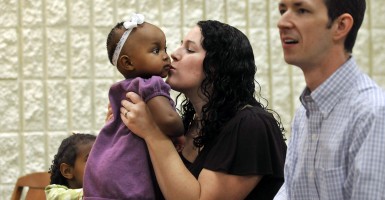Kelly Rosati, whose four children joined her family through foster care adoption, knows first-hand the pain and difficulties caused by a broken child welfare system.
“These are kids who wake up every day not knowing if they are going to be moved that day, who have no permanence in their lives,” Rosati said. “Many of them have only known neglect, abuse and abandonment.”
“Because we don’t have orphanages in America,” she says, “we think we don’t have orphans—but we do.”
Every year about 400,000 children spend time in our nation’s foster care system, with roughly 100,000 eligible for adoption, as we point out in our recent Backgrounder. Many bounce from home to home and are never adopted. Many will “age-out” of foster care, facing increased risk for low academic achievement and poverty.
And yet various states have adopted policies that would require faith-based providers to place children with same-sex couples, in violation of some agencies’ deeply held beliefs that children deserve a mom and a dad – effectively forcing these agencies out of adoption and foster care service. These policies do nothing to help children and unnecessarily limit the number of good agencies working on their behalf.
On Wednesday,, Rep. Mike Kelly, R-Pa., and Sen. Mike Enzi, R-Wyo., introduced the Child Welfare Provider Inclusion Act, which would protect the right of child welfare providers, including private and faith-based adoption and foster care agencies, to continue providing valuable services to families and children. The federal government and states receiving certain federal child welfare funds would be prohibited from discriminating against a child welfare provider simply because the provider declines to provide a service that conflicts with their religious or moral convictions.
This is good policy. The efforts of faith-based organizations and the work of more than 1,000 private, licensed foster care and adoption providers across the United States are helping to increase the number of children adopted every year.
As vice president of Community Outreach for Focus on the Family, Rosati directs the organization’s Wait No More program. Wait No More conducts one-day events that provide the tools, information, and network to encourage families to consider opening their homes and lives to the hundreds of children waiting for adoption in their own communities.
To date, 2,700 families across 17 states have begun the process of adopting children who are in foster care. In Colorado alone, the number of children in foster care waiting for adoption was reportedly cut in half within just a couple of years because of ongoing efforts such as Wait No More and other faith-based collaborations.
Private providers handle roughly a quarter of the domestic adoptions by non-relatives that occur in the United States. Faith-based agencies also provide spiritual, emotional and relational support to families that seek to adopt or become foster parents they are less likely to receive from state-run agencies.
Foster care and adoption policy should seek to increase the number of families willing to foster and potentially adopt children, not risk reducing the number of agencies or families working for children. Provided these agencies meet basic requirements, they should be free to operate according to their values, especially their reasonable and religiously informed beliefs about marriage.
Protecting religious liberty in this instance takes nothing away from anyone. Couples who do not wish to work with faith-based agencies because of a difference of belief are free to work with another private provider or directly with the state offering foster care services. A diversity of providers only increases the chances more children will end up in permanent, loving families.
America’s foster care programs are in dire need of systemic reform. Foster care and adoption policy always should put the best interests of children first, and that means removing barriers to families seeking to adopt and providers seeking to place children in those loving homes.




























